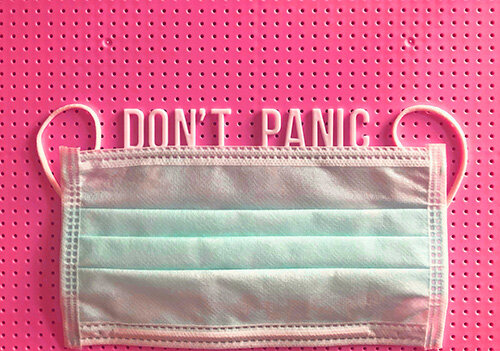Mask Anxiety
So, we’re back to normal. Semi-normal. The ‘new’ normal. There is an excitement in the air about being able to see other people again. Perhaps a deeper appreciation for connection now we have a degree of freedom back again but then there are the guidelines that we need to adhere to while we’re at it. And this new way of life can feel quite odd because, well, there is an under-lying fear or unease when we’re out and about. The UK government has stated that it is compulsory to wear a mask in public. And there are a lot of opinions on that.
While it is so important to feel safe and to think more about vulnerable or high-risk people around you and less about vanity, there are some issues to be aware of. Wearing a mask can affect the air we breathe in and so can make some feel panicked or claustrophobic, it can bring on feelings of unease, anxiety or fear. It can affect identity or body image by covering up and it also is a stark and it is a visual reminder of the global crisis which may be scary and triggering for some or many people.
There are also the smaller but still relevant effects of wearing a mask – it makes your glasses steam up, it rubs off your make up and whether we chose to wear a mask or not there is the potential of judgement from other people.
In accepting this and being kind to yourself in navigating through this new normal, it is also important to look at the other side. To think about the countless lost lives since COVID-19 hit, the healthcare workers who have spent the last few months physically exhausted, worked beyond their means, mentally and emotionally drained, overwhelmed and begging, pleading us to make that little action of wearing a mask. The small businesses who have suffered, staff who have lost their jobs and the greater affect this has on their families, their well-being and their right to thrive in society. The sick people in hospital who are suffering alone, who cannot have their family around them for comfort, for safety and for connection. The families who have had to bury their loved ones, celebrating their lives with no one around them either.
It may be worthwhile to consider while it is not ideal, it may be a small price to pay for the safety of the vulnerable.
It was stated that 80% of cases are non-asymptomatic or mild so there may be many of us walking around with it which could be harmful to high-risk people. Also, important to note that the death rates in countries are much lower where it is the norm or mandatory to wear a mask.
The government states that ‘you do not have to if you have a reasonable excuse not to’, so it is not mandatory for those who have a mental or physical illness, if it is essential to eat, drink or take medication or if it causes severe distress. So if this is you, be patient and clear with people who do question why you don’t wear a mask and if it isn’t and you see some non-mask wearers, it’s nice to hold back the judgement and be mindful on the reasons for all of us.
There challenges that go with getting used to this new habit and coping with mask-wearing are real, so we have compiled some tips for making mask-wearing easier on navigating through this time to make it easier on your own emotional and mental well-being;
o Get plenty of fresh air before and after mask-wearing;
o Practise wearing your mask at home before leaving;
o Choose comfortable and loose clothing to wear;
o Invest in a comfortable and trendy mask – make it fun to match your outfit;
o Add a pleasant scent to your mask to add calm or comfort;
o Bring a tissue to wipe glasses and perch them at the top of the mask to reduce steam;
o If communicating to others with a mask on brings negative or scary feelings, focus away from the face;
o Smile with your eyes and use gestures while communicating;
o Be supportive and don’t judge!
Whatever you choose to do, approach it with compassion to you and to others, keep up to date with the guidelines and laws and don’t forget to practice social distance, sanitise and wash your hands!
Stay safe and if you need to see what further support is possible, please reach out. We’d love to chat!



